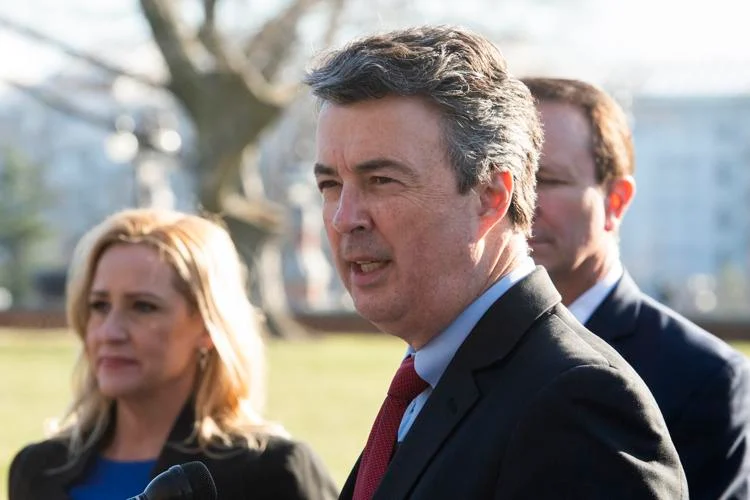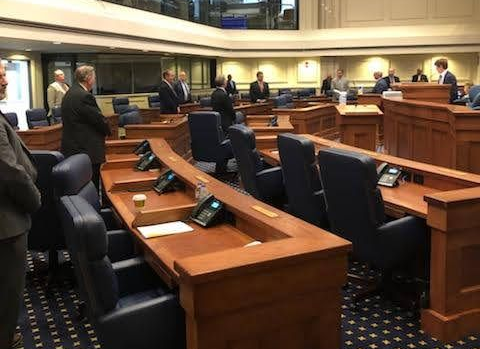Big Ten mayors host annual breakfast

On Wednesday, the Alabama Big Ten Mayors hosted legislative leaders at a breakfast on the Sixth Floor of RSA Plaza. The mayors thanked the legislators for their service and asked them to support their 2023 legislative agenda. Montgomery Mayor Steven Reed said, “There are a lot of great things happening in this city and across Alabama.” “We had a record year in economic development in the city,” Reed said. “It could not have happened without great help from the state of Alabama and our elected representation.” Reed said that the new $90 million waterpark would be an “economic lynchpin” for the city. “Gen Z picks the place and then picks the job,” Reed said. “That is a little bit different from what I was used to. We found the job and then went to the city where it was.” Reed said the water park would feature whitewater rafting next to a walking trail on the Alabama River and Maxwell Air Force Base. “It will definitely be a destination,” Reed stated. Mobile Mayor Sandy Stimpson is the Chairman of the Big Ten Mayors. “This started in 2014 as the big 5,” Stimpson said. “We started meeting on a quarterly basis. We found out that we had the same problems.” “That morphed into the Big 10 Mayors in 2019,” Stimpson. “Rebuild Alabama was our first focus. Rebuild Alabama has been great for the state.” Stimpson said that the mayors next got involved in Anaiah’s Law. “There was a repeat offender who had already shot a couple of people,” Stimpson said. “We asked the judge: Don’t let him out. The judge said: I have to. If you don’t like it, change the constitution.” The Mayors then got behind Anaiah’s law, which was sponsored by State Rep. Chip Brown. That amendment to the Alabama Constitution passed the Legislature and was ratified by the voters in the 2020 election. Tuscaloosa Mayor Walt Maddox said that the Mayors are urging the Legislature to pass the Simplified Sellers Use Tax. “Small business is the heart of our cities,” Maddox said. “We know it is not easy, but these are the people borrowing the money and taking the risk to build our communities, and they are the heart of our downtowns.” Lieutenant Governor Will Ainsworth said, “The big ten mayors play a big role in our state. Thank you for your support of our incentives package.” Senate President Pro Tempore Greg Reed said, “We will be looking at a four bill incentives package,” “We have had great success in Alabama with incentives,” Reed said. “We have created tens of thousands of jobs.” Speaker of the House Nathaniel Ledbetter said, “Our state is growing at a pace that I have not seen in my lifetime.” Ledbetter credited the incentives package for contributing to this growth. “The incentives have led to $40 billion in investment in the state and created 60,000 jobs,” Ledbetter said. “Rebuild Alabama has changed Alabama’s economy. All over the state, you see (road construction) barrels wherever you go. It used to not be that way.” “Ports are hugely important,” Ledbetter said. “We are expanding our port and building a new one in Montgomery.” Stimpson said, “75% of the people in Alabama live in the state’s metropolitan areas, and most of the economic growth occurs in the metropolitan areas.” The Alabama Big 10 Mayors include Auburn Mayor Ron Anders, Birmingham Mayor Randall Woodfin, Decatur Mayor Tab Bowling, Dothan Mayor Mark Saliba, Hoover Mayor Frank Brocato, Huntsville Mayor Tommy Battle, Madison Mayor Paul Finley, Mobile Mayor Sandy Stimpson, Montgomery Mayor Steven Reed, and Tuscaloosa Mayor Walt Maddox. Wednesday will be day 8 of the 2023 Alabama Regular Legislative Session. The Alabama Constitution limits the regular session to no more than thirty legislative days during a regular session. To connect with the author of this story or to comment, email brandonmreporter@gmail.com.
Law enforcement leaders support Steve Marshall’s Gang Prevention Act

Alabama Attorney General Steve Marshall applauded a letter submitted to the Alabama Legislature from 162 Sheriffs and Chiefs of Police from across the state calling for the swift passage of legislation that would prosecute 16-year-olds as adults if they commit a serious crime furthering the interests of a gang. Senate Bill 143 (SB143) is sponsored by State Sen. Will Barfoot. The same legislation has been introduced in the House as House Bill 191 (HB 191) by State Rep. Allen Treadaway. The Alabama Gang Prevention Act provides penalty enhancements for felonies committed to further the interests of a gang, attaches a minimum sentence to any use of a firearm to promote a gang, and certifies individuals aged 16 and older as adults when charged with gang-related offenses under the Act. “Gang violence has steadily increased over the last decade, but we must refuse to accept in Alabama,” the sheriffs and police chiefs wrote. “The legislature can help to curb this trend by enacting the Alabama Gang Prevention Act,” said Attorney General Marshall. “Together, we are urging the swift passage of this legislation that will give state and local law enforcement the tools they need to take back our streets.” “Currently, Alabama has no law on the books to specifically combat or deter gang activity and gang violence,” the letter explains. “Gang violence is a cancer and tough sentences are the antidote.” According to the synopsis, “This bill would identify gang members. This bill would enhance penalties for any criminal activity that benefits, promotes, or furthers the interest of a gang. The bill would establish mandatory consecutive penalties for any individual who knowingly possesses, uses, or carries a firearm during the commission of any act intended to benefit, promote, or further the interest of a gang. Under existing law, juveniles 16 years of age or older are tried as adults for certain crimes. This bill would require any juvenile 16 or older to be tried as an adult for any gang-related criminal activity.” On Tuesday, Senate Bill 119, which would have prosecuted 16-year-olds as adults for assaulting the staff of a juvenile corrections facility with a weapon, was carried over in the Senate after Senate Minority Leader Bobby Singleton objected to prosecuting 16-year-olds as adults. The sponsor, Sen. Linda Coleman-Madison, is working with Singleton on a compromise. SB143 and HB191 potentially would lead to many more youthful offenders being prosecuted as adults. It also has the potential to exacerbate Alabama’s prison overcrowding situation. SB143 will be considered by the Senate Judiciary Committee when it meets on Wednesday in Room 325 in the Alabama Statehouse. HB191 will be considered by the House Judiciary Committee on Wednesday afternoon when it meets in Room 200. Wednesday will be day 9 of the 2023 Alabama Regular Legislative Session. To connect with the author of this story or to comment, email brandonmreporter@gmail.com.
Senate Committee to hear legislation requiring Ethics Commission to share exonerating evidence with accused defense counsel

On Wednesday, the Senate Judiciary Committee will consider whether or not to advance legislation requiring that the Alabama Ethics Commission share evidence uncovered that would exonerate persons accused of wrongdoing. Senate Bill 103 is sponsored by State Sen. Arthur Orr. The legislation is in response to an advisory opinion issued last year by the Alabama Ethics Commission itself stating that the Commission’s investigators do not have to share any exonerating evidence with the attorneys of persons being investigated by the Commission. Alabama Attorney General Steve Marshall strongly objected to that position. He claimed that that position, which is counter to the rules of evidence in an Alabama courtroom, makes prosecuting any cases referred to the Attorney General’s office by the Commission problematic at best. The Attorney General’s office has sued the Ethics Commission to force the Commission to overturn the policy. Marshall has gone so far as to argue that any referral to prosecute someone from the Ethics Commission is “worthless” when it is highly possible that either in the trial or later when that conviction is appealed, it becomes known that there was exculpatory evidence already known to the Ethics Commission, but that evidence had been intentionally suppressed by the Ethics Commission or its staff. “Thus, the respondent can neither be confident that he fully understands the case against him, nor that the exculpatory evidence has been considered by the Ethics Commission before it votes on whether to refer the matter for prosecution or administrative resolution,” the lawsuit states. “In either case, the respondent’s legal defense is impeded.” According to the synopsis. “This bill would require the State Ethics Commission, before referring a case for prosecution of an alleged ethics or campaign finance violation or before resolving a violation administratively, to provide the person who allegedly violated the law with exculpatory evidence in the possession of the commission.” Passage of SB103 would mean that the Ethics Commission would have to share any evidence that it finds indicating that the accused may have been innocent of whatever crimes they have been charged with the accused and their attorneys before the Commission issues its judgment as well as before it refers any cases to the attorney general’s office or a district attorney for criminal prosecution. The Commission’s counsel has argued in court filings that this would “have a chilling effect” on the work of the Commission. SB103 is one of seven bills being considered by the Senate Judiciary Committee when it meets in Room 325 on Wednesday in the State House. As of Monday, 471 bills have been filed thus far in the 2023 Alabama Regular Legislative Session. Wednesday will be day 9 of the regular session. The Alabama Constitution limits the regular session to no more than thirty legislative days during a regular session. To connect with the author of this story or to comment, email brandonmreporter@gmail.com.
Steve Flowers: Democrats give Donald Trump a lifeline

As mentioned last week, the Presidential race has begun. The first bomb or salvo was dropped last week with the political indictment of Donald Trump by a Democratic New York Manhattan borough prosecutor. It used to be off-limits to use the courts to indict a person for political reasons. Make no mistake about it; this trumped-up political ploy is just that – political theatrics. There is an old saying that you can indict a potato. The legal threshold for getting a grand jury to offer a writ of indictment only requires there is a scintilla of evidence that there may be a crime or misdemeanor. Therefore, a prosecutor can orchestrate an indictment. There will never be a conviction of Trump in this ploy. It would take six years of delaying and going through appellate courts before the case would ever be heard, and it would probably be thrown out by one of the appeals courts for lack of culpability. You may ascertain from the facts whether you think it was a Democratic ploy or not. You have a Democratic district attorney in an overwhelmingly Democratic state and local Democratic venue, who ran on a platform of garnering an indictment of former President Trump for some reason, and he is running for reelection in a Democratic primary. If, indeed, political prosecution has become the new partisan weapon in political skullduggery, then you could very easily see a Republican district attorney in rural Idaho get an indictment against Joe Biden for many reasons. The New York indictment and arraignment of Trump is as far as this case will go. The purpose of the Democratic district attorney has been fulfilled and accomplished. The sensationalism was met with glee by the liberal media. However, it was also met with glee by one Donald J. Trump. It gave him a political lifeline. Make no mistake; the New York charade was politically motivated, but not for the reason you would think. Most would assume the Democrats wanted to bloody Trump in order to beat him in the General Election next November against Biden. Not so. That story is written. That boat has sailed. Polling reveals Trump cannot be elected President. He is detested by 75% of the American electorate. Believe me, from years of observing politics, if you have a candidate who begins the race with 100% name identification and 50% negative, they should not run. They will lose. There is no mistake about it, if Trump is the nominee of either party or any party. He will lose. The only other candidate who has similar negative numbers like Trump is Joe Biden. If you have a race between Joe Biden and Donald Trump, the old political truism that more people vote against someone than vote for someone will definitely come into play. Biden would beat Trump much worse than four years ago. Biden’s negatives are 50%. Trump’s negatives are 75%. Therefore, Biden would out negative Trump again. There are no independents or Democrats who will vote for Trump, and only 30% of Republicans embrace him. The bottom line is any Republican besides Trump will beat Joe Biden, and any Democrat will beat Trump, including Joe Biden. So, you ask, why are the Democrats attacking Trump? The answer is they are trying to help him win the Republican nomination. The act has worked. Trump has a hard core 30% of Republican primary voters. He had become so unpopular even among Republicans that he had dropped to 25%, with Florida Governor Ron DeSantis at 40% without DeSantis being in the race. This New York Democratic ploy has brought such an outcry of sympathy for Trump among Republicans that he has jumped from 25% to 45% in the polls. He has also milked the Democratic scheme for over $10 million in campaign contributions. In short, Trump was going down the tubes in hopes of being the Republican nominee, but the Democrats gave him a lifeline. It also helps Trump by diffusing any other political indictments brought against him, which may have more merit than this one but will now be viewed as frivolous and political. The Democratic effort to make Trump the Republican nominee may not succeed. Ultimately they were hoping Trump could at least get to 50% polling with the outrage of their ploy, but he has only jumped from 25% to 45%. This 45% will probably drop back to 30 to 35% in about a month when DeSantis and others join the fray. In the meantime, Democrats will do all they can to try to make Trump the GOP nominee. The Presidential race is in full swing. Machiavelli is not dead, even if Donald Trump is. See you next week. Steve Flowers is Alabama’s leading political columnist. His weekly column appears in over 60 Alabama newspapers. Steve served 16 years in the state legislature. Steve may be reached at www.steveflowers.us.
Jurors never heard of accomplice letter in death row case

Sixteen years after David Phillip Wilson was sentenced to death for killing a man during a 2004 burglary, the state of Alabama turned over a letter allegedly written by an accomplice saying she was the one that beat the victim with a bat until he fell. A federal judge last month ordered the Alabama attorney’s general’s office to turn over a copy of the letter, noting the jurors never got a chance to hear about it even though prosecutors possessed the letter before Wilson’s trial and believed it to be authentic. The judge said while it’s “plausible” Wilson might still have been convicted and sentenced to death, the letter must be turned over to determine its importance. “The jury was not told that an accomplice of petitioner’s who admitted entering (the victim’s) home also claimed that she beat the victim with a baseball bat while he was alive,” U.S. District Keith Watkins wrote in the March 27 court order. A portion of the letter was turned over to Wilson’s new attorney last month after a lengthy legal battle that unfolded over several years as they seek to win him a new trial. The Alabama attorney general’s office argued in court filings that Wilson knew about the letter’s contents since before his trial and that it did not exonerate him since Wilson told investigators he also hit the man and put an extension cord around his neck. Wilson’s new attorney argued prosecutors and the state actively hid potentially exculpatory evidence. “For almost twenty years, since August 2004, the State of Alabama through its District Attorney for Houston County and its Attorney General has hidden, withheld, and actively obstructed the disclosure of a written confession by petitioner’s co-defendant,” Wilson’s lawyer, Bernard Harcourt, wrote in a court filing. The state gave Wilson’s attorney only one page of the letter that discussed the killing. Harcourt is asking the judge to force the state to turn over the remainder. Wilson was convicted of capital murder for the 2004 death of Dewey Walker, 64, during a robbery and burglary. Walker was found dead in his home, after failing to show up for work. Investigators said Wilson confessed to being there to steal a computer and that after Walker discovered him, he admitted to hitting Walker with a bat and then putting an extension cord around his neck to try to get him to drop a knife. Three others were sentenced to between 23 and 25 years in prison for Walker’s killing. Wilson was the only one sentenced to death after a jury recommended a death sentence by a 10-2 vote. At issue in the case is a 2004 letter allegedly written by one of the three accomplices who said she was the one who began hitting the man with a bat. The writer identifies herself as Catherine Corley. Corley pleaded guilty to murder and was sentenced to 25 years in prison for Walker’s death. According to court filings, the letter, in which she discusses the possibility of an insanity plea, was sent to another detainee at the Houston County Jail, and that detainee provided the letter to an attorney, who then provided the letter to prosecutor Douglas Valeska. “David slipped up behind Dewey and put an extension cord around his neck, Dewey would not fall. I did not know what to do, so I grabbed the baseball bat & hit Dewey with it till he fell. David & I loaded up all we could find. … About one week later, we got caught. I threw baseball bat in trash dumpster,” the letter states. Corley, who is still serving her sentence, could not immediately be reached for comment, and it was not immediately known if she has a lawyer to speak on her behalf. Prosecutors are required to turn over exculpatory evidence, also known as Brady material, to criminal defendants. Judge Watkins chided the prosecutors for their handling of the matter. He said Wilson’s trial counsel was given a series of police “offense reports” that described acquiring a letter where the writer claimed to have “hit Mr. Walker with a baseball bat until he fell.” “At best, it appears the (accomplice) confession was disclosed to the defense in a manner designed to not attract attention to it, thus to put the defense at a trial and sentencing disadvantage. As the Supreme Court has made clear, Brady’s disclosure obligation is not readily discharged via gamesmanship,” the judge wrote in a footnote in the ruling. The Alabama attorney general’s office argued state courts had already ruled there was no evidence suppression because, “Wilson knew – at the very least – that the letter stated that Corley had also struck Mr. Walker and that the State believed she was its author.” They also argued that Wilson had confessed to hitting and strangling Walker. “The Corley letter is not exculpatory. Wilson gave a detailed confession to the investigators in which he admitted that he broke into Dewey Walker’s home, that he struck Walker with a baseball bat, that he choked Walker with a mouse cord until it broke, and that he continued to choke Walker for six more minutes with an extension cord,” state lawyers wrote in a December court filing. The judge also wrote that while Wilson’s “own confession was damning and, as (the state attorney general) argues, supported the jury’s verdict that petitioner is guilty of capital murder,” that it “is no stretch, however, to argue that a co-defendant’s admission of a possibly greater role in the murder… might be a material consideration in a jury’s deliberation on whether to recommend a death sentence.” Republished with the permission of The Associated Press.
As grocery prices soar, push grows to end sales tax on food

Alabama is one of only three states that tax groceries at the same rate as other purchases. But as food prices soar — and as the state sees a record budget surplus — Alabama lawmakers are considering removing, or phasing out, the state’s 4% sales tax on food. Competing proposals are being introduced by Democrats and Republicans in the Alabama Legislature to end the sales tax on all, or at least some, groceries. While the idea has been proposed for decades in Montgomery, it has gained traction this session. Alabama Arise, an organization that lobbies for policies that would benefit low-income families, said the average Alabama family spends $600 a year on the state grocery tax, and removing it would be a lasting benefit to families struggling to make ends meet. “Our families are hurting. We can’t afford to pay 4% on top of already expensive food,” Robyn Hyden, executive director of Alabama Arise, said during a Tuesday press conference and rally outside the Alabama Statehouse. Only Alabama, Mississippi, and South Dakota still tax groceries at the full state sales tax rate. South Dakota Gov. Kristi Noem had urged lawmakers to remove that state’s sales tax on groceries, but lawmakers instead approved a general sales tax cut. Various lawmakers, mostly Democrats, have proposed removing the state sales tax on food since at least the early 1990s, but the proposals were never approved, partly because of the projected blow to education funding. The tax on groceries provides more than $600 million annually to schools, according to estimates from the Legislative Services Agency. Alabama primarily uses sales and income tax collections to provide the state’s share of education funding. Soaring grocery prices, coupled with a record budget surplus, have lawmakers in both parties throwing their support behind the idea. But the proposals vary on if the tax would be removed on all food items and if the revenue stream would be replaced. “We can all agree on this: That the tax on groceries is just plain, wrong and unfair,” Sen. Merika Coleman, D-Pleasant Grove, said. Coleman’s proposal would let voters decide whether to remove the state sales tax on food and replace the money by ending the deduction that allows Alabamians to deduct federal income tax payments before computing their state income taxes. She said the tax break disproportionately lowers taxes for the wealthiest people. “Let them choose whether they prefer a tax loophole that mostly benefits the richest few or if they want a grocery tax cut that benefits everyone,” Coleman said. The Alabama Republican Party on Tuesday released a survey of registered voters that it said showed a vast majority support removing the sales tax on food. “One of the core beliefs of the Republican Party is that government exists for the benefit of the people, not the other way around. We want to help those families and individuals struggling with food prices right now. It’s time to end the grocery tax,” Alabama Republican Party Chairman John Wahl said in a statement. Republican Sen. Arthur Orr, who chairs the Senate Finance and Taxation Education budget-writing committee, has proposed to phase out the state sales tax on some foods, such as milk, eggs, vegetables, fruit, whole-grain bread, and baby formula. The bill would use the list of food items that are covered by the federal Women, Infants and Children nutrition program to decide what would be untaxed. Orr said last week that would offer relief to families while also limiting the blow to the education budget. That WIC definition, if used, would leave the state sales tax on meat, desserts, and many other items. Others have discussed using the list of foods eligible under the Supplemental Nutrition Assistance Program. That would remove the state tax on most grocery items, but leave it on items such as alcoholic beverages or prepared meals that are hot at the point of sale. The Legislative Services Agency estimated that would cost the state $608 million annually. Hyden said their organization supports the “broadest possible” proposal for removing the tax on food, as well as proposals that would protect education funding. State Rep. Penni McClammy, the daughter of the late Rep. Thad McClammy, said during the Alabama Arise press conference that she has shared the difficult decisions many families face in trying to stretch a budget at the grocery store. “I was a caregiver. I know what it feels like to make decisions on buying Depends, Ensure, medication. What we call healthy food is the most expensive food in the grocery store,” McClammy, D-Montgomery, said. Republished with the permission of The Associated Press.
Joe Biden issues second veto of his presidency on Clean Water Act regulation

President Joe Biden vetoed the second bill of his presidency on April 6, 2023. Biden vetoed H.J.Res.27, a joint resolution of disapproval under the terms of the Congressional Review Act (CRA) that sought to void an Environmental Protection Agency and Army Corps of Engineers rule from 2023 that specified “which bodies of water fall under the scope of the Clean Water Act and are thereby under federal jurisdiction and protected.” In his veto message, Biden said, “The resolution would leave Americans without a clear definition of ‘Waters of the United States’. The increased uncertainty caused by H.J. Res. 27 would threaten economic growth, including for agriculture, local economies, and downstream communities. […] The resolution would also negatively affect tens of millions of United States households that depend on healthy wetlands and streams.” Overriding a presidential veto requires a two-thirds majority vote in both chambers of Congress. The House of Representatives and Senate both initially passed the resolution by a simple majority. The House of Representatives voted 227-198 to approve the resolution on March 9, 2023. The Senate voted 53-43 to approve the resolution on March 29. Rep. Sam Graves (R-Mo.) introduced the resolution on February 2. President Ronald Reagan issued the most vetoes (87) of all presidents since 1981. Biden, with two vetoes, has issued the fewest. President Donald Trump issued the second-fewest vetoes (9) within this timeframe. Presidents have issued 2,586 vetoes in American history. Congress has overridden 112. President Franklin D. Roosevelt vetoed 635 bills, the most of any president. Presidents John Adams, Thomas Jefferson, John Q. Adams, William H. Harrison, Zachary Taylor, Millard Fillmore, and James A. Garfield did not issue any vetoes. Republished with the permission of The Center Square.

